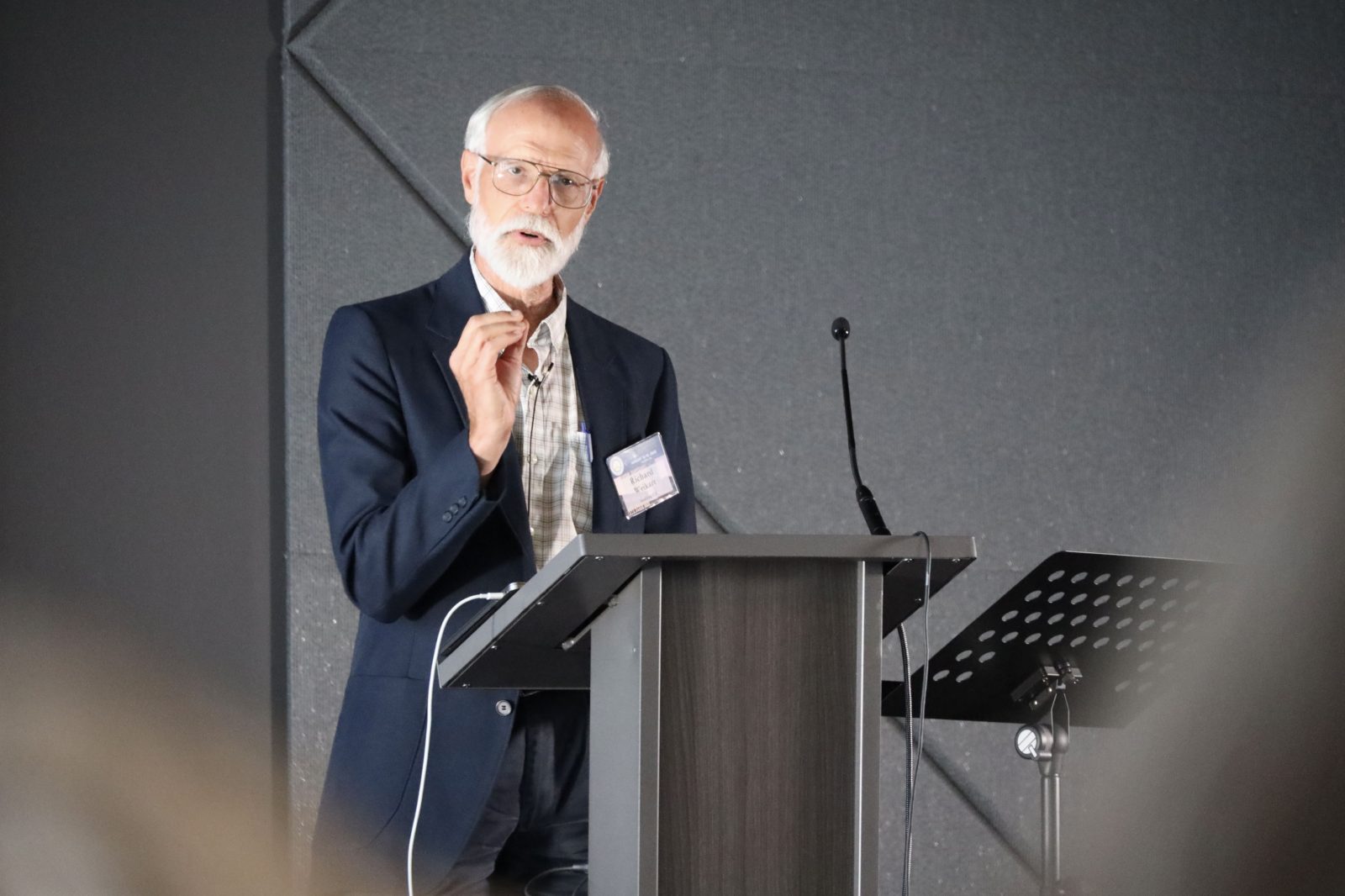


Engineering, not Evolution, Explains the Body

David Berlinski on Chickens, Eggs, Human Exceptionalism, and a Revolution

God’s Grandeur: Ann Gauger on Beauty, Intelligibility, and Human Uniqueness

Darwinian Racism Then and Now
Today’s ID the Future spotlights Darwinian racism, past and present. In this first half of a panel discussion at the 2022 Center for Science and Culture Insider’s Briefing, Darwin Day in America author John West introduces the other panel members, teases an upcoming book, Darwin Comes to Africa, and discusses his experience visiting the Museum of Criminal Anthropology in Turin, Italy, where the work of infamous Darwinian criminologist Cesare Lombroso’s racist ideas about evolution and race are on dramatic display. Then historian Richard Weikart, author of Darwinian Racism, debunks the popular media claim that white nationalist racism in America is a Southern evangelical phenomenon. Weikart shows that the most prominent white nationalists show little if any interest in promoting Christianity, but they very consistently anchor their racist ideas of white superiority and the racial struggle for supremacy in Darwinism, with straightforward links to Charles Darwin’s own ideas and arguments in The Descent of Man. Weikart is careful to emphasize that Darwinism does not necessarily lead its adherents to racism and, in fact, most Darwinists today are not racists. But racist ideas were woven into modern evolutionary thinking from the beginning and do serve as a major inspiration for white nationalist writers and even for some recent mass shooters. Weikart ends his lecture with a twist. He says there is one strongly anti-racist component in Darwinian materialism: Darwinian materialism, if true, means that all humans are equally without value — just so many DNA survival machines in a world without higher purpose or meaning. A grim takeaway, but only for those who feel compelled to embrace modern Darwinism. If you are open to questioning it, there are a wealth of resources at this podcast and at intelligentdesign.org showing that the evidence points strongly in another direction.

David Berlinski on Nazism, Darwinism, Emotivism, and Nature Rights
On today’s ID the Future, Human Nature author David Berlinski continues his conversation with host Wesley J. Smith. Here Berlinski reflects on the Jewish Holocaust, the destructive nihilism of the Nazis and the SS, and the shortcomings of Neo-Darwinism as an explanation for the diversity of life. Berlinski and Smith also discuss the increasingly widespread attacks on human exceptionalism, the growth of emotivism and why it’s a problem, and the bizarre nature rights movement. This is the second and concluding part of a conversation borrowed, with permission, from Wesley J. Smith’s Humanize podcast.

Wesley J. Smith Sounds the Alarm on Germline Genetic Editing
On today’s ID the Future, bioethicist Wesley J. Smith makes the case for passionate opposition to, and stricter bioethical regulations against germline genetic engineering that changes not only the genetics of the subject but also of all that subject’s descendants. He and episode host Casey Luskin discuss germline genetic editing in China, the brouhaha that ensued when the experimental work by He Jiankui came to light, and why Smith is convinced that China’s disapproving response is less than it appears on the surface. He’s convinced, he explains, that the Chinese government wasn’t upset that the Chinese scientist conducted the experiment. They surely knew about his work and allowed it, Smith says. Rather, they and the scientific establishment internationally were upset that Jiankui went public before the public had been softened up to embrace germline genetic editing with lots of talk about how it will save lives. Smith argues the health benefits being pursued can be achieved without permanently altering the germlines, and he warns of a brave new world of eugenics pursued using CRISPR technology and germline editing. As he explains, it’s not just that germline editing could lead to unintended health consequences, or that such changes could work their way into the human population long term. It’s also that the eugenics mindset driving much of this experimental work threatens to undermine the foundational belief that all humans possess inherent dignity and worth, not just those humans who are genetically edited and enhanced. The occasion for the conversation is Smith’s bioethics chapter in the recently released anthology from Harvest House Publishers, The Comprehensive Guide to Science and Faith.

Bidding Adieu to Steven Weinberg’s Take on Science and Faith
On today’s ID the Future, Casey Luskin, associate director of Discovery Institute’s Center for Science and Culture, discusses his Evolution News article about the recently deceased Steven Weinberg. On Weinberg’s view, one of science’s social functions is to undermine religion, which he sees as superstition. Luskin takes the opposite view and points to skilled and successful scientists he got to know in Africa. He says these scientists are convinced that the supernatural is real and would find Weinberg’s secular Western rejection of the supernatural as blinkered. Luskin and host Robert Crowther also discuss a hopeful trend among some atheists toward a more civil and respectful way of engaging intelligent design, even to the point of acknowledging that design theorists are making thoughtful, substantive arguments. Luskin summarizes six lines of evidence for design, and encourages people to escape the internet atheist bubble and read the best ID scholars firsthand rather than depending on strawman summaries of those arguments.

Darwin Day Meets Black History Month–Sparks Fly
As a nod to Darwin Day and Black History Month, today’s ID the Future spotlights the racist thinking of Charles Darwin and the scientific racism fueled by Darwinism and Darwinists. As guest and historian Michael Flannery notes, Darwin’s followers, including Darwin’s cousin, Francis Galton, took ideas found in Darwin’s work and used them to vigorously press the case for eugenics, a movement that came to have a horrifying impact for American blacks in the twentieth century, including for thousands who were subjected to forced sterilizations. Was Darwin’s racism purely a function of his time and place, Victorian England? Flannery says no, and on two counts. First, he says that the co-discoverer of the theory of evolution by natural selection, Alfred Russel Wallace, was far more progressive about non-Anglo indigenous races than was Darwin, arguing that they were very much the equals of Europeans, morally and intellectually. Such an outlook is dramatically different from Darwin’s, who saw them as far inferior and destined to be weeded out by the process of natural selection one day. Also, while Wallace came to embrace a form of intelligent design and to reject philosophical materialism, Darwin and many of his followers saw his theory as both rooted in, and supporting, a materialistic outlook on nature. Humans, in other words, were without an immaterial soul. This materialistic view of the human person, Flannery and host Jay Richards argue, vitiates the traditional theological understanding of humans as made in the image of God with inherent dignity and worth. As Richards further notes, Martin Luther King Jr. made precisely this point himself. Tune in as Flannery and Richards explore this oft-neglected corner of history.

How to Destroy Love with Darwinism
On today’s ID the Future, host Andrew McDiarmid presents an Evolution News essay, “How to Destroy Love with Darwinism.” Altruism as defined by evolutionists means “behavior by an animal that may be to its disadvantage but that benefits others of its kind.” It’s not an easy fit with Darwinism, since Darwinian evolution is all about passing your favored genes onto your offspring. How can a creature do that if she gives her life for another, particularly when it’s not even her own children, and before she has produced any offspring? Such individuals fail to pass on their own genes — a seeming conundrum for Darwinism. Evolutionists have made some progress (they think) explaining such things with theories of group selection or kin selection. But those explanations face some fresh challenges and don’t even begin to explain self-sacrificial acts done for non-kin, a behavior we see among humans. From a design perspective, though, such behaviors are not baffling, for they are not genetically determined acts, as if humans are only wet robots governed by genes. They are acts of true self-sacrificial love, done freely and made possible because reality is more than matter and energy, and humans are more than just DNA survival machines.